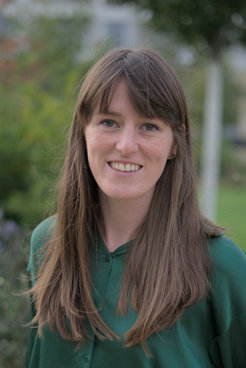ERC Starting Grant for Claire Donnelly
Claire Donnelly has been awarded a Starting Grant from the European Research Council (ERC). She is the Lise Meitner Group Leader of Spin3D at the MPI CPfS and will use the grant to explore the effects of three dimensionality on quantum nanomaterials.
Quantum materials form a class of materials which exhibit exotic properties due to their underlying quantum interactions, that spans magnets to superconductors. Not only do these materials host exciting physical phenomena: they are highly relevant for society, already playing key roles in energy production, data, and medicine, with exciting prospects for future technologies.
Key to the future of quantum materials is our ability to tune – and design – their emergent properties. Many advances have been made through careful tailoring of crystal structure and composition, as well as the application of strain, which have not only led to insights into new physics, but also opportunities for technological applications.
In her ERC Starting Grant 3DNanoQuant, Claire Donnelly and her group spin3D will pursue a new route to controlling the functionality of quantum materials: through the extension to three dimensional nanogeometries.
There are two key aspects of the concept: the nanoscale, and the three dimensionality. First, the nanoscale is a highly relevant lengthscale for many quantum systems – be it the exchange length of magnets, or the coherence length or penetration depth of superconductors, meaning that the properties of nanopatterned materials can be locally changed (or designed!), even going beyond what is possible in bulk systems. By taking these nanogeometries to the third dimension, it will be possible to tune local anisotropies, chirality and even topologies through the design of curvilinear systems.

In order to make this transition to 3D possible, Claire and her group will develop a new toolbox for 3D quantum nanomaterials, involving both the nanofabrication of functional 3D devices, as well as new capabilities to characterise their three dimensional properties. As part of this project, she will apply this toolbox to a selection of quantum materials: magnets, antiferromagnets, and superconductors, to explore new physics, and pave the way for the next generation of technological devices.
Claire was awarded her PhD for her work on three dimensional magnetic systems from the ETH Zurich in 2017. During her PhD she developed X-ray magnetic tomography, that allowed for the visualisation of three dimensional magnetic textures, work that was recognised by a number of prizes. She then moved to the University of Cambridge and the Cavendish Laboratory as a Leverhulme Early Career Research Fellow, where she was awarded the L’Oreal For Women In Science Fellowship, and the European Magnetism Association Young Scientist Award. Since September 2021 she is a Lise Meitner Group Leader of Spin3D at the Max Planck Institute for Chemical Physics of Solids in Dresden, Germany, and recently received the IEEE Magnetics Society Early Career Award.
ERC Starting Grants
ERC starting grants support promising researchers at the beginning of their independent career. The researchers receive approximately 1.5 million Euros to support their group for 5 years. In the 2023 call 400 starting grants were awarded across all disciplines, with 20 grants awarded to Max Planck Society researchers. The grants are part of the EU’s Research and Innovation programme, Horizon 2020.












